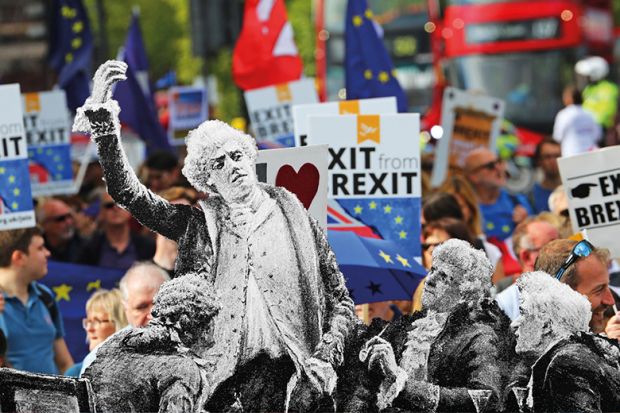As a child of 1980s West Germany my prevailing personal memories of growing up are of positive change: the rejection of fascism and the advancement of democracy and equality.
Yet I see today that those advances are nowhere near as deeply rooted in Western societies as I had come to assume.
From Brexit to Trump to current developments in Poland, hard-won progress is being undone at an alarming speed. Historians have an important role to play in challenging that.
My academic upbringing was at the University of Bielefeld. Established in the late 1960s as a reform university, it was founded on the principles of progressive learning and interdisciplinarity – the latter to the point that the university’s building itself was designed to facilitate it, a central hall physically connecting all faculties.
I chose Bielefeld partly for that interdisciplinary foundation. The Bielefeld School of thought had developed "Gesellschaftsgeschichte", a new kind of interdisciplinary social history that examines society through processes and structures.
Those academic roots are important, however, not only for how they shaped my thinking as a historian, but also how I view the role of historians. Leading scholars from Bielefeld in the late 1980s showed how historians can engage in, and lead, debates about critical political and social questions of the time – in this case, the question of how Germany can interpret and ought to deal with its Nazi past.
This was a question that entered wider public discourse in 1986 with the publication of Ernst Nolte’s feuilleton Die Vergangenheit, die nicht vergehenwill ("The past that will not go away") in Frankfurter Allgemeine Zeitung.
Nolte wanted to draw a line under Germany’s past, criticising what he considered excessive interest in the history of the Nazi regime. He argued that most Nazi crimes, such as deportations, had been seen elsewhere before, for instance during the Russian Revolution, and that, therefore, the Nazi regime ought to be viewed in that context rather than as unique.
His piece drew widespread criticism nationally and internationally. In Germany, it triggered the so-called Historikerstreit (historians’ argument), with prominent Bielefeld historians taking a strong position against Nolte.
This debate was much more than an argument between historians. It also brought to the fore how Germany confronts its past, something the UK has not done in the same way, as well as two much more fundamental questions that we often discussed when I was a student. First, what can – what should – historians do when they see a defining political/social moment in the present where their intervention might make a difference? And second, what can – what should – they do, when that intervention might blur the lines between their knowledge and their view, might make them political?
After the EU referendum, there can be no doubt – whatever one’s position on Brexit itself – that the UK is at a defining moment: a point at which it needs to define not only what the common interest is, but its very future.
Currently, both are being defined primarily by a comparatively small group of politicians and commentators, who are, demonstrably, driven less by safeguarding the best future for the country than by ideology or their own interests.
Many of them frequently employ history for their ends to establish a particular narrative, be it by using anti-German tropes referencing the Second World War to facilitate an anti-EU argument, or by invoking nostalgia for a glorious imperial past that never existed.
Yet while history is frequently used, historians themselves – academics and experts more broadly – are derided and dismissed. Judges, MPs, the civil service and essentially anyone who questions anything about Brexit are attacked as traitors.
This is a climate in which historians can provide much needed context and interpretation. They can challenge myths and short-term thinking. They can help make sense of the present.
Expressing knowledge as well as a view, especially when that view is political view, can come at a price. I know that from my own experience of abuse.
However, when public debate is constantly sacrificed for soundbites and click-baits, is threatened and undermined by 'fake news', we need historians to draw parallels to help make sense of the present.
Historians must not only take a step forward but also take a stand. There is a time for all of us historians to dare and it is now.
Tanja Bueltmann is a professor of history at Northumbria University




